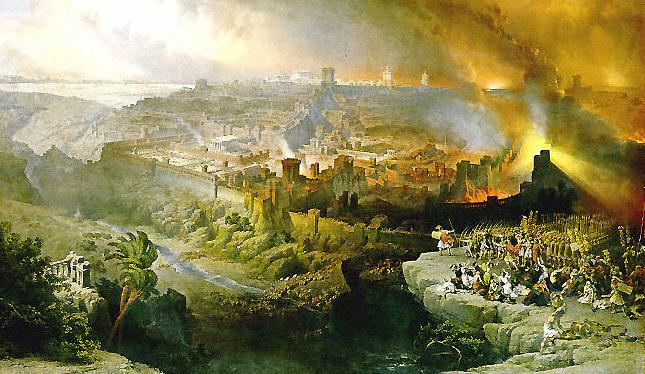As Jesus drew near Jerusalem, he saw the city and wept over it, saying, “If this day you only knew what makes for peace, but now it is hidden from your eyes. For the days are coming upon you when your enemies will raise a palisade against you; they will encircle you and hem you in on all sides. They will smash you to the ground and your children within you, and they will not leave one stone upon another within you because you did not recognize the time of your visitation.”
Luke 19:1-10
The merciful Redeemer wept over the fall of the false city, the fall which the city itself did not know was coming. As it is added, saying, If you had known, even you would weep. You who now rejoice, for you do not know what is at hand. For when Jerusalem gave herself up to worldly pleasures, she had the things which in her day might be her peace. But why she had present goods for her peace, is explained by what follows, "But now they are hidden from your eyes." For if the eyes of her heart had not been hidden from the future evils which were hanging over her, she would not have been joyful in the prosperity of the present.
Jesus here declares that His coming was to bring peace to the whole world. For to this He came, that He should preach both to them that were near and far. But as they did not wish to receive the peace that was announced to them, it was hid from them. And therefore the siege which was shortly to come upon them He most expressly foretells, adding, "For the days are coming upon you, etc." By these words the Roman leaders are pointed out. For that overthrow of Jerusalem is described, which was made by the Roman emperors Vespasian and Titus. But how these things were fulfilled we may gather from what is delivered to us by the historian Josephus Flavius, who though he was a Jew, related each event as it took place, in exact accordance with Christ's prophecies.
But our own Jerusalem is also wept over, because after sin enemies surround it (that is, wicked spirits), and cast a trench round it to besiege it, and leave not a stone behind; especially when a man after years of chastity, is overcome, and enticed by the temptations of the flesh, has lost his strength and his modesty, and has committed fornication, they will not leave on him one stone upon another. According to Ezekiel 18:24, "His righteousness I will not remember."
參考 References:
Catena Aurea (St. Thomas Aquinas)
Homily 39 on the Gospels (St. Gregory the Great)
Church History, Book III (Eusebius of Caesarea)
Origen
